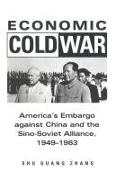Read more
Why would one country impose economic sanctions against another in pursuit of foreign policy objectives? How effective is the use of economic weapons in attaining such objectives? To answer these questions, the author examines how and why the United States and its allies instituted economic sanctions against the People's Republic of China in the 1950s, and how the embargo affected Chinese domestic policy and the Sino-Soviet alliance.
The literature on sanctions has largely concluded that they tend to be ineffective in achieving foreign policy objectives. This study, based on recently declassified documents in the United States, Great Britain, China, and Russia, is unusual in that it looks at both sides of "the China embargo." It concludes that economic sanctions provide, in certain circumstances, an attractive alternative to military intervention (especially in the nuclear age) or to doing nothing. The author argues that while the immediate effects may be meager or nil, the indirect and long-term effects may be considerable; in the case he reexamines, the disastrous Great Leap Forward and Anti-Rightist campaign were in part prompted by the sanctions imposed by the United States and its allies. Finally, though the embargo created difficulties within the Western alliance, Beijing was driven to press the USSR for much greater economic assistance than Moscow thought feasible, and the ensuing disagreements between them contributed to the collapse of the Sino-Soviet alliance.
Going beyond the rational choice approach to international relations, the book reflects on the role of mutual perceptions and culturally bound notions in shaping international economic sanctions. In addition to contributing to a better understanding of the economic aspects of Cold War history, the book attempts to give more empirical substance to the developing concept of "economic diplomacy," "economic statecraft," or "economic warfare" and to relate it to the idea of conflict management.
About the author
Shu Guang Zhang is Professor of U.S. History and International Relations at the University of Maryland. He is the author, most recently, of
Deterrence and Strategic Culture: Chinese-American Confrontations, 1949-1958, and
Mao's Military Romanticism: China and the Korean War, 1950-1953.
